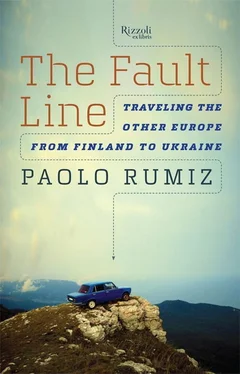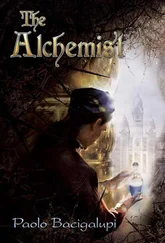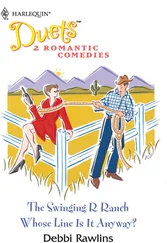But we still haven’t solved the problem of the Belarus visas. We can ask for a tourist visa, but everyone rushes to warn us not to be too clever, because the Minsk police are implacable. On the other hand, we’re not going to Belarus to conduct an investigation but simply to travel, and what’s more, by the most “transparent” means of all, the train. So we decide to declare ourselves journalist and photographer but also to write the word tourism in the box asking the purpose of our visit. Last precaution: for fear—which will prove to have been exaggerated—that my notes might be seized, I photocopy them page by page and send them to my address in Italy. Then I hand over my car to a young woman named Ola who is planning to come to Italy in a month with a friend.
Meanwhile, with a little wheedling and a lot of patience, Monika succeeds in getting the visas. The road is clear.
The next day we’re back at the Warsawa Centralna station waiting for the train to Belarus. We’re feeling euphoric again. After giving up on the car, our journey seems to have acquired greater awareness. Right there on the threshold of the last dictatorship in Europe, we realize that we are free and that slowness allows us to ransom our occupations—photography and journalism—which have become embroiled in the race for profits and the allure of the virtual. We are also replacing investigation with the simple sampling of the territory, casual encounters instead of appointments. Warsawa Centralna is comfortable. The TV screens do not show a succession of commercials, as they do in Italian stations, but news, and it’s news from the border. Arrests for smuggling in Zamość, drug traffic in Lublin, cross-border tourism between Poland and Lithuania.
In the waiting room, I see people who are starved for space like us. Young people with backpacks, families with children who are reading in anxious anticipation. Children reading—there’s another thing that’s disappeared where I live. I’m in the midst of a people of travelers. Being constantly on the move was an obsession for Pope John Paul II, and nomadism is a Polish national illness. It’s not only the desire for freedom after the fall of Communism. It’s also the reflection of an ancient claustrophobia, born of the sensation of being crushed between two cumbersome neighbors, Russia and Germany. So cheers for Warsaw, cheers for Kapuścińsky’s shoes. Into my fifteen-pound backpack, I have slipped an old edition of Journey to Poland by Alfred Döblin, the only luxury extracted from my car. The adventure begins again.
Even the name of the train is propitious: Niemen , variant of Neman, one of Middle Europe’s great rivers, maybe the most legendary. In Poland, every child knows its name from a historical novel about the country’s peasant origins. Napoléon crossed it with his Grand Armée at the start of his Russian campaign. It happens that the spirit of places seeks refuge in minor rivers. In the Drina and the Tibiscus (Timiş), for example, rather than in the Danube, which they flow into.
The Drina marks a still visible cultural frontier between the empire of the East and the empire of the West; in Serbia you can read about it in elementary-school books. For Hungarians, on the other hand, their Timiş signals the beginning of the great open spaces to the east, the endless horizons beyond the elbow of the Carpathians.
My mind grinds together sleepiness and thoughts, and in the meantime the train crosses the Bug, wide and brown in the midst of an absolute flatness covered with woods. The map says Treblinka is just a few miles away. As we’re nearing Czyżew, the flash of an image: a shack in the middle of the forest with a thirty-foot white limousine out front. Next to us, on the window side, a couple of peasants in their seventies, sturdy as trees. They’ve both taken their shoes off, and she has put her feet between his legs on the seat. They don’t smile. They don’t read. They speak only rarely, in the low voice of the confessional, and when they do, it’s all a shishing of Polish s ’s. Monika’s language sweetens everything, even death (ś mier ć compared to the sour smrt of the Serbs), but it has the defect of revealing itself immediately with its excess of softened consonants that sound like a pair of shuffling slippers in an empty house. With a language like that, you can’t gossip, conspire, or even prompt, because it’s a dead giveaway.

10. NEMAN
AT BIALYSTOK, near the frontier, we change for White Russia. Waiting for us is a little brown local. The flatness of the landscape and the consequent absence of curves account for the small gap between the cars, which is less than two feet. Instead of the accordion connector of normal trains, passage between cars is by way of a simple open gangway as on the trains of the Old West. Because there are no doors, looking back from the first car behind the engine, I can see all the way to the last one, at the end of a straight line of Euclidean perfection. One police officer can keep watch over the whole train without moving, and I can see a crowd of women spilling out from the compartments—small-time smugglers—loaded with all kinds of packages and bags. I haven’t seen anything like it since the 1970s, when Yugoslavs returned home from Trieste wearing four pairs of jeans. Bedlam.
“Tanya, give me a hand here,” and there goes a pack of DVDs, vanished inside her bra. “Natasha, help me out,” and a roll of Scotch tape does a circumnavigation of a thigh, attaching a pair of iPods as an electronic garter. If the Kaliningrad–Berlin was transformed into a picnic area in response to customs checks, the Bialystok–Grodno turns into a dressing room, for the same reason.
The acoustics are dominated by the zips with which four, even five dresses are shimmied into place over female flanks, by the ripping of adhesive tape, the unwrapping of packages, and the scrunching of cellophane. Hundreds of CDs vanish into old books, shiny new gym shoes are filled by delicate feminine feet.
Robust women are in the minority; contraband is dominated by the slender, who have more useful room under their skirts and jackets.
The train leaves the station at a snail’s pace toward the Belarus barbed wire. It never bends, despite the ups and downs of some occasional hills. The fields grow wilder, trees appear that are older and stouter than the trees in Poland. On board, the frenzy grows instead of diminishing, and the re-dressing and concealment manages to emanate, despite the rushing, its own sort of professional nobility.
When the women, having noticed my notebook, fall into a fearful silence, I decide to delegate the scene to memory and put my notebook back in my pack. I make a conciliatory gesture with my hand. In response come smiles of complicity, sighs of relief, the final adjustments of skirts and jackets. Then out come the spray deodorants, to hide the cellophane smell of newly purchased goods. The final touch of clandestine professionalism.
A half-hour stop in the middle of fields. I offer a sampling of Polish cherries.
The pretty smugglers accept and begin eating ostentatiously as the police are checking passports. This too is a masking operation. Eating is a sign of a clear conscience. Two police officers have come on board, with a wolf-dog, an official, and the train conductor—an attractive brunette in fishnet stockings. They are satisfied just to stamp passports and don’t show much interest in the goods. The train pulls out again into the underbrush, and fifteen minutes later, it slows down, rumbling into the station in Grodno. The luggage check, it’s clear by now, will be done on the ground.
Читать дальше













